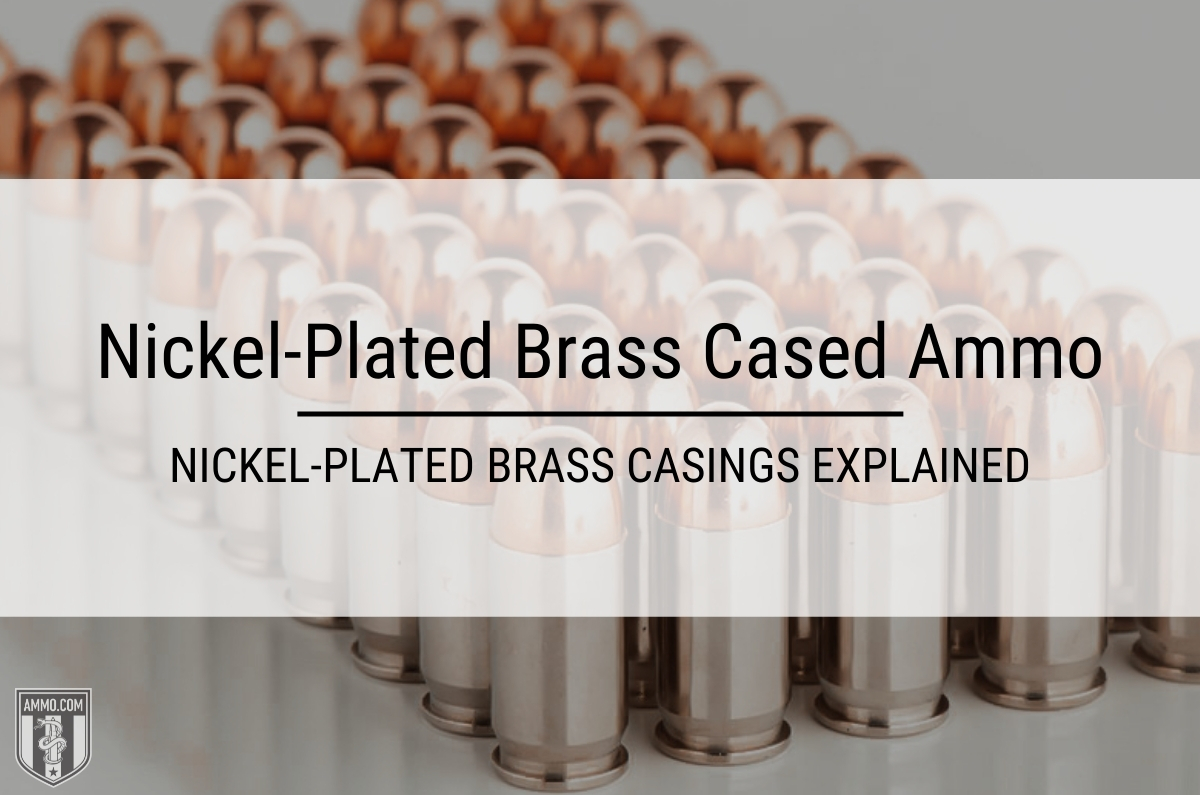Nickel-Plated Brass Cased Ammo: Nickel-Plated Brass Casings Explained

For both pistol and rifle ammunition, nickel-plated brass casings offer a unique spin on the standard brass or steel casings. When it comes to nickel vs. brass, nickel-plated brass looks nicer than standard brass casings and can be reloaded – making it a great choice for someone looking for an aesthetically pleasing and functional cartridge case. Remington, Federal, and Hornady are noted for using nickel-plated ammo in their premium lines.
There are two major advantages that nickel-plated brass ammo has over traditional brass or steel cased ammo:
- Nickel plated brass ammo has higher resistance to corrosion.
- Nickel plated brass cases typically have smoother feeding into the chamber.
But some shooters have more questions about nickel-plated brass cases like:
- Can you reload nickel plated brass cases?
- Is reloading nickel plated brass safe?
- Will reloading nickel-plated brass damage my reloading dies?
- Is it safe to fire nickel plated brass ammo in my firearm?
You’ll find all of the answers to these questions below.
If you’re curious about how nickel compares to brass casing, check out our article on nickel vs brass casings.
Can you reload nickel-plated brass?
Nickel-plated brass cases are 100% safe to reload. However, there are a few caveats you should be aware of before you start running those nickel plated brass casings through your progressive press.
First, nickel plated brass is more brittle than traditional brass casings, meaning nickel plated casings are more prone to neck splitting/cracking after only a few reloads. Therefore, you need to be more diligent with your case prep and inspection before you begin reloading nickel plates brass.
During a reloading session, you will need to pay more attention when resizing the nickel-plated brass cases and flaring the case mouth. This is typically when splits occur and you can feel the difference in the press upstroke and/or downstroke.
The second issue is that split cases can leave nickel fragments inside your dies. This is a rarer occurrence, but it can happen. When these fragments get wedged into the die, they can gouge the interior of the reloading die or future cases.
The final issue is more of an annoyance than an actual problem. However, nickel has different metallurgical properties than brass, therefore some of your dies might need to be adjusted to ensure proper resizing, mouth flair, and crimping.
Reloading nickel plated brass is a fun and rewarding process that can greatly increase the reliability and consistency of your favorite firearms. Always inspect your nickel-plated brass cases prior to reloading and make sure you don't see any signs of case splitting or flaking off of the nickel plating.
If something just "doesn't feel right" during a session while reloading nickel plated brass, stop immediately and inspect your press, dies, and cases, as this might be a sign that you have a split neck or there is a problem with your press.
However, reloading nickel plated brass is typically an easy process that doesn't require much additional work and can be an amazing cost saving measure for your shooting needs.
Corrosion Resistance
Law enforcement looks highly upon nickel-plated casings due to their corrosion resistance. They are created by electro-plating brass casings with a thin layer of nickel. The result is ammo that is highly resistant to verdigris (those green spots that show up on old brass). While mainly associated with cartridge loops on leather gun belts and cases, this corrosion can sometimes show up in other unexpected places where you store your ammo.
Smooth Feed
Nickel-plated brass casings feed smoother than your average brass casing due to its naturally lower friction than brass – which leads to smooth feedings and extractions in semi-automatic weapons. This improves the weapon's overall performance and reduces the odds of getting a jam. Smoother feeds also lead to less overall wear and tear on your firearm, so you’ll be replacing less parts over the years.
Appearance
Many armed professionals and concealed firearms carriers find the nickel-plated brass cases easier to see when checking the chamber to make sure their firearms are loaded. Nickel-plated brass casings with an appealing bullet simply look phenomenal – and you can use these as decoration if you have some old revolvers on the wall. A nice spread of this ammo around a firearm can transform it into art. This is also the ammo commonly found on jewelry because of its shiny exterior.
Conclusion
Should you buy nickel-plated brass over regular brass? That comes down to what you’re going to do with it. Nickel-plated has a better anti-corrosion factor, which is perfect for those who stockpile or buy in bulk. It all comes down to personal preference with this particular casing, but one thing is for sure – nickel-plated brass shoots as well as it looks.
